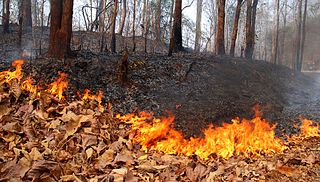
The American Chemistry Council (ACC), formerly known as the Manufacturing Chemists' Association and then as the Chemical Manufacturers' Association, is an industry trade association for American chemical companies, based in Washington, D.C.

A drinking straw is a utensil that is intended to carry the contents of a beverage to one's mouth. Straws are commonly made from plastics but environmental concerns and new regulation has led to rise in reusable and biodegradable straws. These straws are often made of silicone, cardboard, or metal. A straw is used by placing one end in one's mouth and the other in a beverage. By employing suction, the air pressure in one's mouth drops causing atmospheric pressure to force the liquid through the straw and into the mouth. Drinking straws can be straight or have an angle-adjustable bellows segment. Drinking straws have historically been intended as a single-use product and several countries, regions, and municipalities have banned single-use plastic straws to reduce plastic pollution. Additionally, some companies have even voluntarily banned or reduced the number of plastic straws distributed from their premises.

Plastic shopping bags, carrier bags, or plastic grocery bags are a type of plastic bag used as shopping bags and made from various kinds of plastic. In use by consumers worldwide since the 1960s, these bags are sometimes called single-use bags, referring to carrying items from a store to a home. However, it is rare for bags to be worn out after single use and in the past some retailers incentivised customers to reuse 'single use' bags by offering loyalty points to those doing so. Even after they are no longer used for shopping reuse for storage or trash is common, and modern plastic shopping bags are increasingly recyclable or compostable. In recent decades, numerous countries have introduced legislation restricting the sale of plastic bags, in a bid to reduce littering and plastic pollution.

A plastic bag, poly bag, or pouch is a type of container made of thin, flexible, plastic film, nonwoven fabric, or plastic textile. Plastic bags are used for containing and transporting goods such as foods, produce, powders, ice, magazines, chemicals, and waste. It is a common form of packaging.

Shopping bags are medium-sized bags, typically around 10–20 litres in volume, that are used by shoppers to carry home their purchases. Some are intended as single-use disposable products, though people may reuse them for storage or as bin liners, etc.; others are designed as reusable shopping bags.

Marine debris, also known as marine litter, is human-created waste that has deliberately or accidentally been released in a sea or ocean. Floating oceanic debris tends to accumulate at the center of gyres and on coastlines, frequently washing aground, when it is known as beach litter or tidewrack. Deliberate disposal of wastes at sea is called ocean dumping. Naturally occurring debris, such as driftwood and drift seeds, are also present.

Thailand's dramatic economic growth has caused numerous environmental issues. The country faces problems with air, declining wildlife populations, deforestation, soil erosion, water scarcity, and waste issues. According to a 2004 indicator, the cost of air and water pollution for the country scales up to approximately 1.6–2.6% of GDP per year. As such, Thailand's economic growth has come at great cost in damage to its people and environment.

Woolworths Holdings Limited is a South African multinational retail company that owns the South African retail chain Woolworths, and Australian retailers David Jones and Country Road Group. Woolworths, however, has no association to Australia's Woolworths supermarket chain.

A reusable shopping bag, sometimes called a bag-for-life in the UK, is a type of shopping bag which can be reused many times, in contrast to single-use paper or plastic shopping bags. It is often a tote bag made from fabric such as canvas, natural fibres such as jute, woven synthetic fibers, or a thick plastic that is more durable than disposable plastic bags, allowing multiple use. Other shoppers may use a string bag or a wheeled trolley bag. They are often sold in supermarkets and apparel shops.

Plastic pollution is the accumulation of plastic objects and particles in the Earth's environment that adversely affects humans, wildlife and their habitat. Plastics that act as pollutants are categorized by size into micro-, meso-, or macro debris. Plastics are inexpensive and durable making them very adaptable for different uses; as a result manufacturers choose to use plastic over other materials. However, the chemical structure of most plastics renders them resistant to many natural processes of degradation and as a result they are slow to degrade. Together, these two factors allow large volumes of plastic to enter the environment as mismanaged waste and for it to persist in the ecosystem.
There are various issues of waste management in Thailand, including excessive plastic use, industrial waste, among others.

Proposition 67 was a California ballot proposition on the November 8, 2016 ballot. A "Yes" vote was to approve, and a "No" vote to reject, a statute that prohibits grocery and other stores from providing customers single–use plastic or paper carryout bags but permits the sale of recycled paper bags and reusable bags for a fee.
The Plastic Pollution Coalition (PPC) is an advocacy group and social movement organization which seeks to reduce plastic pollution. PPC operates under the fiscal sponsorship of the umbrella organization Earth Island Institute.

Plastic containers are containers made exclusively or partially of plastic. Plastic containers are ubiquitous either as single-use or reuseable/durable plastic cups, plastic bottles, plastic bags, foam food containers, Tupperware, plastic tubes, clamshells, cosmetic containers, up to intermediate bulk containers and various types of containers made of corrugated plastic. The entire packaging industry heavily depends on plastic containers or containers with some plastic content, besides paperboard and other materials. Food storage nowadays relies mainly on plastic food storage containers.

The phase-out of lightweight plastic bags in Australia is being implemented by the states and territories rather than nationally, with plastic bag bans implemented in all jurisdictions with NSW being the last from 1 June 2022. The intent of the bans is to help reduce the amount of plastic pollution in the environment, both in and around Australia and globally.

The Hong Kong plastic shopping bag environmental levy scheme is an environmental levy scheme designed to reduce the manufacture and distribution of plastic shopping bags (PSBs) in Hong Kong. PSBs are made of materials that are not easily degradable. The extensive disposal of PSBs is putting stringent pressure on the very limited landfill capacity, thereby causing severe waste problems in Hong Kong.

The Bahamas Plastic Movement is a Nonprofit organization based out of the South Eleuthera, Bahamas that focuses on reducing plastic pollution. The organization was founded in 2014 by Kristal Ambrose. The organization specializes in using youth to end plastic pollution. They are an active member of the Plastic Pollution Coalition.

Packaging waste, the part of the waste that consists of packaging and packaging material, is a major part of the total global waste, and the major part of the packaging waste consists of single-use plastic food packaging, a hallmark of throwaway culture. Notable examples for which the need for regulation was recognized early, are "containers of liquids for human consumption", i.e. plastic bottles and the like. In Europe, the Germans top the list of packaging waste producers with more than 220 kilos of packaging per capita.

There is no national plastic bag fee or ban currently in effect in the United States. However, the states of California, Connecticut, Delaware, Hawaii, Maine, New York, Oregon, Vermont, and Washington, and the territories of American Samoa, Guam, Northern Mariana Islands, US Virgin Islands and Puerto Rico have banned disposable bags. Additionally, New Jersey has passed a law banning disposable bags that is set to go into effect in 2022. On July 6, 2021 Colorado passed a plastic bag ban set to go into effect in 2024. Over 200 counties and municipalities have enacted ordinances either imposing a fee on plastic bags or banning them outright, including all counties in Hawaii.
Tiza Mafira is an environmental activist from Jakarta, Indonesia. She initiated the paid plastic bag policy enforced in supermarkets throughout Indonesia, and the Indonesia Plastic Bag Diet Movement with various organizations to raise awareness of the harms of single-use plastic bags. Mafira received the Ocean Heroes Award from the UN Environment.
























